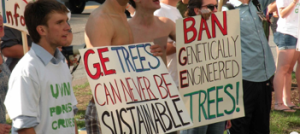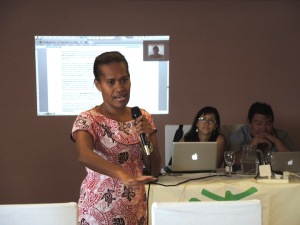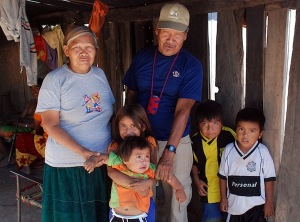
Protesters denounce GE trees at a meeting of the Sustainable Forestry Initiative in 2011
(image by Anne Petermann/Global Justice Ecology Project)
The Global Justice Ecology Project’s Executive Director Anne Peterman was interviewed by Joan Brunwasser on OpEdNews yesterday on the dangers and drawbacks of the GE American chestnut tree being developed by researchers at SUNY Syracuse.
Is GMO Chestnut Tree Monsanto’s Trojan Horse?
Interview by Joan Brunwasser, OpEdNews. 5 January 2015
JB: You’re up in arms against the humble chestnut tree. You recently wrote This Holiday Season say NO to GMO Chestnuts , a strong OpEd piece against it. I admit that I don’t know much about this subject and many of our readers are probably in the same boat. Would you educate us on the subject, please?
AP: Let me be clear first that my background is in forest protection. I have been working to protect the forests of the Northeast US and the world for the last 25 years. I started working on the threats posed by GE trees in 1999 because I worried about their impact on forests. The further I dug, the more concerned I became. So when we talk about the American chestnut tree, we need to understand that this tree was once a key part of the forest ecosystem in the Eastern US. There is an understandably strong desire to return it to that ecosystem. However, I do not agree with replacing wild American chestnut trees with genetically engineered facsimiles.
The reasons for concern about the GE chestnut are many, but one of the main problems is that the GE chestnut has been engineered with foreign DNA from wheat, a process which damages the genome and leads to numerous mutations. This means the engineered tree will likely have unanticipated and unpredictable consequences when released into a forest ecosystem. As we’ve seen time and again with GMO crops, these unanticipated consequences can be very damaging to biodiversity and wildlife, not to mention people. Just take a look at the iconic Monarch butterfly–it’s population is crashing due to the chemicals applied in abundance to herbicide resistant GMO crops. These herbicides are killing off the main food of the butterflies.





